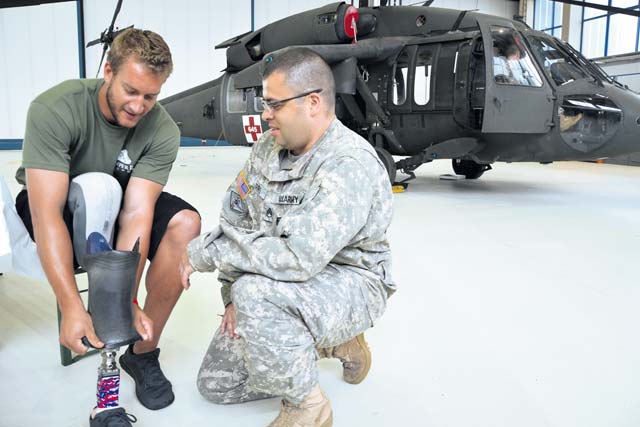
Max Rohn, a Navy Corpsman who lost a leg in Iraq, shows his prosthetic limb to Army Staff Sgt. Robert Dorris, a flight medic from Company C, 1st Battalion, 214th Aviation Regiment. Severely wounded veterans recently visited Landstuhl to see where they were treated, a trip organized by the Semper Fi Fund.
Max Rohn, a Navy Corpsman who lost a leg in a May 2009 ambush in Iraq, barely remembers flying from Fallujah in an Army medical evacuation helicopter or his brief stay at Landstuhl Regional Medical Center.
During a recent visit to U.S. Army Garrison Kaiserslautern, Rohn visited LRMC and Company C, 1st Battalion, 214th Aviation Regiment – an Army medevac unit whose Soldiers have seen their fair share of combat casualties. Both the visiting veterans and the Soldiers said the event was cathartic.
“From the moment I got hit, all the way to Bethesda, it was kind of very hazy and very foggy,” Rohn said. “I don’t know anybody who worked on me. But they sure remembered me.”
Six wounded veterans traveled from the states on a trip organized by the Semper Fi Fund — a nonprofit organization that supports wounded military members, said Karen Guenther, the organization’s founder, president and CEO. She hopes the veterans, each who had one or more amputated limbs, find answers to questions they’ve had in their minds. The idea of returning severely wounded troops to LRMC came from a LRMC care provider who thought it would help veterans to see where they were treated.
“Some remember being back here. Others were in induced comas because their injuries were so serious,” Guenther said. “So, I think it’s very healing for them to come back, meet the nurses, doctors and flight medics.”
On June 17, three Marines, two Sailors and an Airman flew to Germany. At LRMC, staff found the same intensive care beds they used. Rohn said he remembers little of his time at LRMC, except waking to a beautiful girl nearby — something he hadn’t seen for five months before the blast.
The group of veterans and their families also visited the Fisher House, a program supporting families of the injured, and the Contingency Aeromedical Staging Facility on Ramstein, to see the large cargo aircraft that ferried them stateside.
“It’s good to come back and put those pieces back together,” Rohn said.
In 2009, Rohn, 25, of Longmont, Colo., was part of a 12-Marine training team embedded with Iraqi police. His convoy was returning from Baharia, just outside Fallujah, in Iraq’s Al Anbar Province. Troops ahead found a roadside bomb and were waiting on an explosives team to move forward. Rohn’s team sought an alternate route through Fallujah, a decision that led them into an insurgent attack.
“We got held up at a check point. It was all a part of their attack,” Rohn said. “The first vehicle was blocked by a tractor trailer. I was in the third vehicle and they hit me with a grenade. On the left side, guys with (AK-47s) started to shoot at us.”
The grenade blasted through the Humvee door, striking his leg, Rohn said. A Marine corporal tried to render aid, but Rohn pushed him aside and treated his own wounds. The Marines rushed Rohn to Al Taqaddum Airbase, known to troops simply as “TQ,” where Army “Dustoff” helicopters flew him to Baghdad.
At the Landstuhl heliport, a catered lunch offered a chance for the wounded veterans and the Army pilots and medics to chat — small talk that quickly led to common memories of places and events downrange.
“I remember being in a litter, the takeoff and then I was gone, unconscious,” Rohn said.
For Rohn, it was important to say “thank you” to the Army medics.
“These guys were not directly involved in my medevac flight, but they’ve been there, done that. They’ve done the same exact thing for another patient,” Rohn said. “Those guys can’t directly thank them. That’s why we’re here.”
Retired in March, Rohn will take part in the 2013 IPC Athletics World Championships, held this July in Lyon, France. A track and field athlete, he throws discus, shot put and javelin. This fall, he starts at Pennsylvania State University to study biomedical engineering – hopefully to help others with prosthetics. And he’d like to compete in the 2016 Paralympic Games.
“My life was planned out since high school. One little grenade changed everything,” Rohn said. “My life became a lot easier as soon as I stopped making plans.”
The veterans’ visit also meant a lot to the Army flight crews, said Staff Sgt. Robert Dorris, 33, of Denver, Colo., a medic with three combat tours, two in Afghanistan and one in Iraq. He explained how evacuations look from his viewpoint.
“We come in when that person is having a nightmare,” Doris said. “We take them and do everything we can, fix them up and get them to the hospital. Then we reset, get our heads right for the next mission.”
Crews rarely see their patients after the hospital drop, he said.
“A lot of times, we separate ourselves from the job to function,” Dorris said. “This visit also gives us a bit of closure.”


